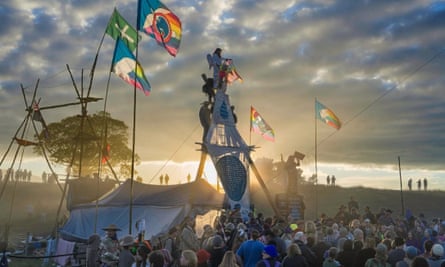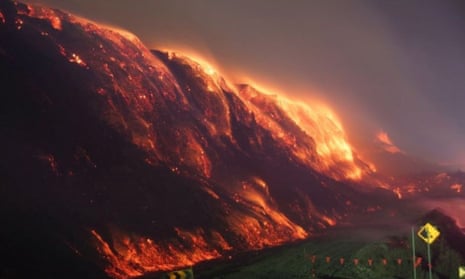It looks like something out of a Hollywood disaster movie. A blanket of smouldering fire stretches across hundreds of hectares, the landscape burning red and blood orange, showering acrid ash and smoke onto surrounding towns. This is what happens when a bushfire combines with a coal mine.
Or maybe the Hazelwood open cut mine fire looked worse than a disaster movie - like a vision of Dante’s Inferno. In early 2014 the fire burned in Victoria’s Latrobe Valley for 45 days. This event is unpacked in unsettling detail - including the horrible health repercussions inflicted on the populace - in a new documentary, Our Power, from Melbourne film-maker Peter Yacono.
Do average Australians understand the gravity of the disaster, which has been linked to the deaths of 11 people? Yacono responds bluntly: “No. Absolutely not. The fire spewed toxic smoke all over the valley for 45 days. It was horrific, like a war zone. They did, seriously, go through a war for 45 days. This is 90 minutes away from Melbourne. It’s like something you hear that happens in third world countries.”
Our Power premieres this weekend at the Transitions Film festival. Also playing is director Brendan Shoebridge’s anti-fracking doco The Bentley Effect, which follows a community uprising against coal seam gas mining in the Northern Rivers region of New South Wales.
Shoebridge’s film begins like a monster movie, with a foul thing roused from an ancient slumber. The narrator explains that a powerful force – methane gas – has been “safely locked away in coal, shale and sandstone” for eons but is now unleashed. The director segues into vision of dramatic protests and follows the story of the people organising and participating them, building to a historical gas protest in Bentley (which looks not unlike a huge music festival).
When he attended a rally in Lismore, NSW, in March 2011, Shoebridge noticed nobody was filming – so he picked up a camera. “Any time a big dirty industry is forced upon a community that aspires to live cleanly, and low impact, there’s always going to be a confrontation,” he says. “I thought it was only a matter of time before that happened. So we followed events ever since – bearing witness, I suppose, to the community’s response to the threat.”
Our Power began in a similarly organic way. In 2015, Yacono attended a Melbourne University climate change presentation where he met community members from the Latrobe Valley. “There was a lady who stood up in the middle of the seminar,” the director says, “and the pain and anguish in her voice was palpable. So we had to go there and see what it was all about. People in the community were crying out for their story to be heard.”

The Bentley Effect and Our Power were entirely self-funded and, so far, self-distributed. Shoebridge and his team spent a “fruitless year” pursuing funding from film bodies before “realising we should throw it back to the community”. They have so far raised more than $50,000. In the battle to get the word out there, the director has opted to do it himself: “The traditional distributors really don’t do a lot for you,” he says. “You are expected to sign over your rights just to join a catalogue for them to offer around.”
The similarly cash-strapped Yacono, who also hit roadblocks when he pursued conventional film funding, has so far raised around $20,000. Given few Latrobe Valley locals filmed the fire (“the community was busy surviving”) he has had to rely on news footage. According to the director that costs $80 per second plus GST. “It’s quite ridiculous,” he says. “We’re just trying to get the story up but a lot of the time our hands are tied behind our backs.”
Defying the adage that only friends or family will give you money to finance a movie (and even then it’s a tough sell), the success of the two entrepreneurial film-makers suggests the potential for a new film movement, comprising activist documentaries made about – and funded by – local communities, boosted by social media, crowdsourcing and low-cost digital campaigns.
Picking a cause that will remain relevant in news cycle across several years is a key to success. Likewise for a cause that embraces a sense of collective spirit. “This is everyone’s battle,” says Shoebridge about opposing coal seam gas exploration. “I think people are starting to realise that the stuff we are told we need to buy to complete us doesn’t serve us in the end. It goes back to, what is true wealth? What makes us happy? It’s community. It’s serving the greater good.”
Both directors are now taking on the not-insignificant challenge of delivering their film to audiences. But unlike most narrative features, their objective runs deeper than merely filling out a cinema (which is in itself no easy task). Shoebridge hopes that by bringing The Bentley Effect to metropolitan audiences, it will combat the idea that fracking is an issue exclusive to rural communities. “The implications are massive,” he says. “It’s not as if the city are immune to the effects of this industry. We must burst that bubble.”
Similarly, Yacono hopes to use Our Power to connect Melbourne audiences to the Latrobe Valley. He intends to have members of the valley present at each screening, with a panel discussion afterwards so they can field questions from the audience. The extent of each film-maker’s success can only be measured with time; in a sense making their documentaries is only half the fight.
Yacono describes the entire process film-making process as a “David versus Goliath” battle but is optimistic about the impact Our Power can have. “For me, as a film-maker, working on this particular film, I see the potential that if we share with Melbourne stories from the valley, a newfound respect for the valley will come and we can all step forward together,” he says. “I think there’s a strong need for independent film to be out there exploring the true heart and soul of a community.”
- Both Our Power and The Bentley Effect will be screening as part of Transitions Film festival, playing nationally

Comments (…)
Sign in or create your Guardian account to join the discussion